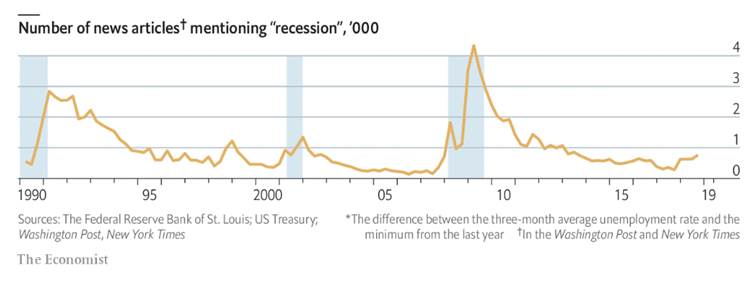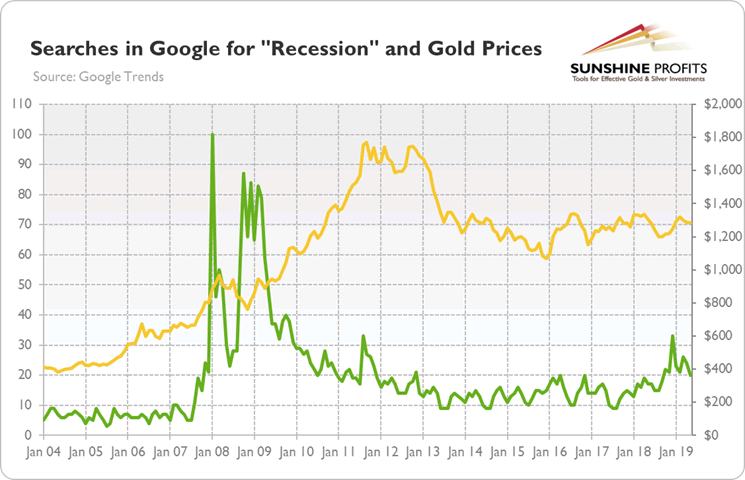Google News Articles and Searches for Recession and Gold / Commodities / Gold & Silver 2019
 Everyone is discussing recession right now. But howmuch do they actually chatter about it? Does this talk reflect or changepeople’s perception? And the key question is: can the world-related indices predict the recession? Are theyuseful for the precious metals investors?
Everyone is discussing recession right now. But howmuch do they actually chatter about it? Does this talk reflect or changepeople’s perception? And the key question is: can the world-related indices predict the recession? Are theyuseful for the precious metals investors?
It turns out that yes! At least to some extent.Let’s start with the R-word index createdby The Economist. Itcounts how many stories in the The Washington Post and The New York Times are using the word “recession” in a quarter. The idea behind the indicator is that economic downturn coincideswith a surge in the frequency of the that scary world starting with R. Theindex surges when recessions are on the minds of people and the financialjournalists who write articles about them. And, indeed, it has been pretty good at spotting economic turning points over thepast three decades. As one see in the figure below, the R-word indexsignaled the start of recessions in America in 1990, 2001, and 2007.
Chart 1: The Economist’s R-word Index from Q1 1990 to Q4 2018.
Is it perfect indicator? Ofcourse not! The R-word index is great, because it is instantly available.However, it emits recessionary signal just before the crises, so it is not thebest leading indicator. And it sent a false warning in 1998. Moreover, the sizeof the spike in the early 1990s was much higher than during the previousrecessions, although they were much more severe.
Another problem is that the gauge sometimes indicates recessions afterthey officially end, as the journalists go on babbling about the slump evenwhen it’s over. This is the main limitation of the index: it does not measure the real economic activity but its perception injust two newspapers (however, Mark Doms and Norman Morin, in a paper “Consumer Sentiment, the Economy, and the News Media”, elaborated of The Economist’s R-word index, constructingindexes reflecting the number of articles about recession from 30 largenewspapers, and they reached similar conclusions). If these two match eachother, that’s perfect. But the perception can be distorted. Remember that thepress loves to shock, as fear sells great.
Currently, the index is notflashing danger. However, the measure is on the rise. When the number surpasses1,000, you might start to worry, having in mind all its shortcomings. You couldthen consider buying gold and sitcomfortably in a chair. And admire the glow of bullion, instead of counting words in the newspaper.
We all know that the media cannot be trusted, right? So maybe insteadof relying on financial journalists, weshould simply ask Uncle Google? After all,instead of going to the doctor, you ask the Uncle how serious your symptomsare. Google is the dominant search engine, so its search term usage can provide a snapshotof current interests in economic issues, including recession. The idea is simple: if many people are entering the same economicsearch terms in the same period, this could reflect changing conditions, suchas the onset of a recession.
So, let’slook at the chart below, which shows the gold prices and the popularity of query for “recession” in the United States fromJanuary 2004 to June 2019.
Chart 2:Searches in Google for “Recession” in the US from January 2004 to June 2019(January 2008 = 100).
As one can see, the term gained the maximum popularity in January 2008,shortly after the official start of the GreatRecession. Since then, thepopularity receded but soared again after the collapse of the LehmanBrothers. Untilrecently, the index remained at a low level, but it surged the end of 2018. Currently (as of mid-June), it stays at 20, a level seen just beforethe last financial crisis. However, it has been in a downward trend in 2019, soalthough the jump from the end of theprevious year is disturbing, there is no reason to panic yet. This indicator does not suggest an imminent U.S. recession.
However, although the index is timely, investors should remember itslimitations. First of all, Google Trends data are available only from January2004, so it covers only one economiccrisis. Second, the spike insearches for “recession” occurred just when the US economy fell officially intorecession, so it is not the best leadingindicator.
What does it all mean for the gold market? Well, both The Economist’sR-word Index and the Google’s Recession Index have increased substantially fromtheir through in mid-2017, which isworrisome and could spur some safe-haven demand for gold. However, both indices do not flash recessionary signals yet. Gold bulls will have to wait to unfold fully their wings, pardon, hooves.
If you enjoyed the above analysis, we invite you tocheck out our other services. We provide detailed fundamental analyses of thegold market in our monthly Gold Market Overview reports andwe provide daily Gold & Silver Trading Alerts with clearbuy and sell signals. If you’re not ready to subscribe yet and are not on ourgold mailing list yet, we urge you to sign up. It’s free and if you don’t likeit, you can easily unsubscribe. Sign uptoday!
Arkadiusz Sieron
Sunshine Profits‘ MarketOverview Editor
Disclaimer
All essays, research and information found aboverepresent analyses and opinions of Przemyslaw Radomski, CFA and SunshineProfits' associates only. As such, it may prove wrong and be a subject tochange without notice. Opinions and analyses were based on data available toauthors of respective essays at the time of writing. Although the informationprovided above is based on careful research and sources that are believed to beaccurate, Przemyslaw Radomski, CFA and his associates do not guarantee theaccuracy or thoroughness of the data or information reported. The opinionspublished above are neither an offer nor a recommendation to purchase or sell anysecurities. Mr. Radomski is not a Registered Securities Advisor. By readingPrzemyslaw Radomski's, CFA reports you fully agree that he will not be heldresponsible or liable for any decisions you make regarding any informationprovided in these reports. Investing, trading and speculation in any financialmarkets may involve high risk of loss. Przemyslaw Radomski, CFA, SunshineProfits' employees and affiliates as well as members of their families may havea short or long position in any securities, including those mentioned in any ofthe reports or essays, and may make additional purchases and/or sales of thosesecurities without notice.
Arkadiusz Sieron Archive |
© 2005-2019 http://www.MarketOracle.co.uk - The Market Oracle is a FREE Daily Financial Markets Analysis & Forecasting online publication.
